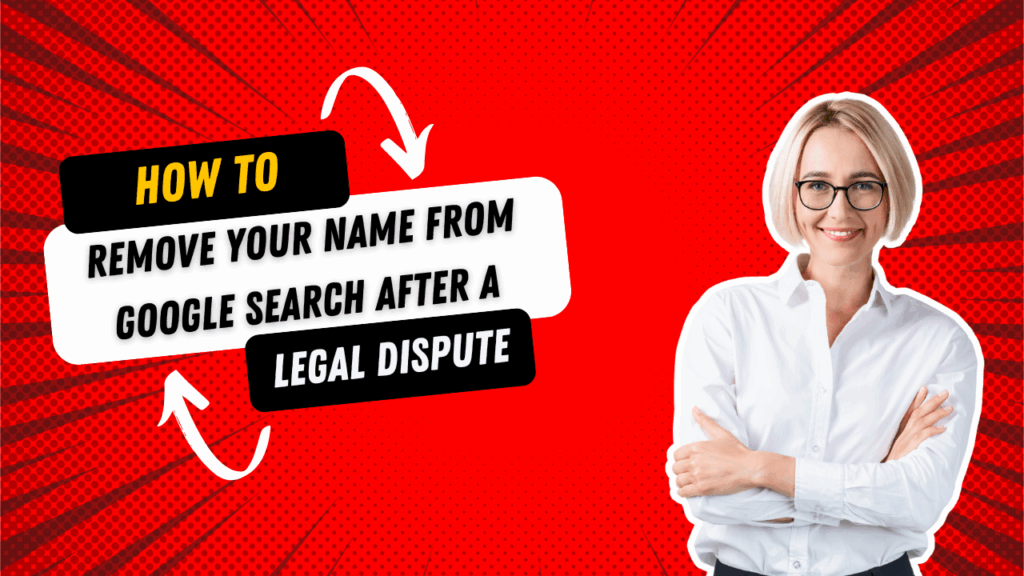Sometimes your name ends up in a court case, and suddenly it shows up all over Google. Even if the case is over, your name might still appear in news articles, court listings, or public record sites. This can cause real problems for your job, relationships, and peace of mind. But there are ways to fix it.
Dig Deeper: How to Remove Court Records from Google Search
Why Legal Disputes Stay Online
1. Public Records Are Meant to Be Public
Court records are part of the public record. That means anyone can access them, and many states post them online.
Some sites collect this information and publish it for free or profit. These include mugshot sites, background check databases, and even some government websites.
Even if your case was dismissed or resolved, the listing might still exist.
2. News Articles Don’t Expire
If your case was covered by the media, that article might still rank high in Google. News outlets rarely remove stories unless they are factually wrong or legally ordered to.
One person we spoke to had their name in a five-year-old story about a court appearance that never led to charges. They said, “Every time I apply for a job, I know they’re going to find that link. It feels like I’m stuck in a loop.”
3. Google Indexes Everything
Once something is posted, Google’s search engine indexes it and makes it searchable. Even if the source is later taken down, the content might still show in search results for weeks or months.
Can You Remove It Without Expungement?
Yes. You don’t always need a court to seal or expunge your case to get your name out of Google. But you do need a strategy.
Steps to Remove Your Name from Google
1. Find Out Where Your Name Appears
Search your name in quotes (“First Last”) to find the most accurate matches. Note what websites show up on the first two pages of results.
Look for:
- News articles
- Court listings
- Public records
- Mugshot websites
- Blog posts or forums
2. Request Removals from the Source
If a site is publishing your name without your consent, reach out and ask them to take it down. This works best for:
- Personal blogs
- Local news sites (especially smaller ones)
- Forums or third-party databases
Be polite and explain your situation. Include proof if the case was dismissed or resolved.
3. Use Google’s Removal Tools
Google allows you to request removal for:
- Outdated content no longer on the source site
- Sensitive personal information (like your home address or phone number)
- Personally identifiable information (PII) that poses a risk
Use the Remove Outdated Content tool or submit a request via their privacy request page.
4. Suppress It with Positive Content
If removal isn’t an option, suppression is your next best move. You want to flood Google with better, newer, and more relevant content about you.
Try these steps:
- Create a personal website with your full name
- Write blog posts about your work or interests
- Optimize your LinkedIn and other social profiles
- Use press releases if you have professional accomplishments
This pushes bad links down so they become harder to find.
One client we worked with said, “We couldn’t get the article removed, but within three months it was buried on page three. That made all the difference.”
5. Contact Data Brokers
Sites like BeenVerified, Whitepages, and Spokeo often list legal records. These sites usually have opt-out forms. It takes time, but removing yourself from each one helps clean up your online image.
Some services offer to do this for you. But you can also do it yourself if you’re patient.
6. Monitor Your Name
Set up Google Alerts for your name so you’ll know when new pages appear. Staying ahead helps you respond quickly.
This is especially important after a legal dispute, when your name might still be mentioned in updates or public comments.
7. Get Help from a Reputation Professional
If this all feels overwhelming, work with a reputation management service. A company like Top Shelf Reputation can handle removals, suppression, and monitoring so you don’t have to do it alone.
What the Law Says
According to a 2023 Pew Research study, 27% of Americans have had an embarrassing or sensitive search result affect their personal or professional life.
Laws are slowly changing to give people more control. The “right to be forgotten” in Europe has made its way into some U.S. legal discussions, especially when content is outdated or no longer relevant.
While there’s no nationwide right to be forgotten in the U.S., some states are testing similar ideas in their own privacy laws.
Final Thoughts
You don’t have to live with your name showing up in Google next to a past legal issue. There are ways to clean things up, protect your reputation, and move on.
Start by searching your name, take inventory of where it shows up, and work through the steps above. The earlier you act, the easier it is to fix.
If you’re not sure where to begin, reach out for help. You don’t need to fight Google alone.
Need help? Top Shelf Reputation specializes in managing court records online, even when they can’t be fully removed. Contact us today to take back control of your online image.

